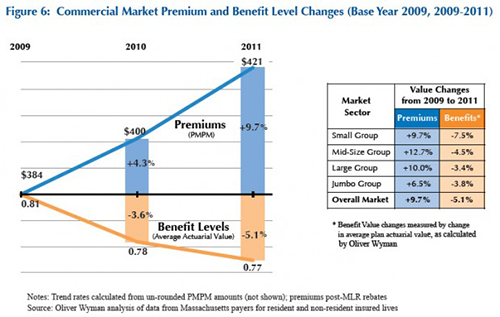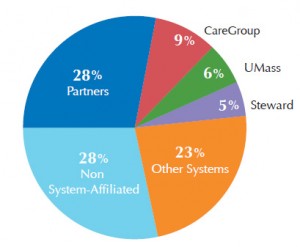Report: Mass. Residents Paying More, Getting Less From Health Insurance
By Martha Bebinger, WBUR
August 14th, 2013, 3:20 PM - Kaiser Health News

If Massachusetts residents have the feeling
theyfre getting less coverage from their health insurance even though itfs
costing more, therefs now evidence that theyfre right.
A
state report says Bay State premiums rose 9.7 percent between 2009 and
2011, while the value of that coverage shrank 5.1 percent.
gWhat wefve seen over the last couple of years is that premiums are growing
faster than inflation and at the same time, the quality of the benefit is
declining,h said Aron Boros, whose state agency, the Center for Health
Information and Analysis, published the report. gSo youfre not only paying more,
youfre getting less.h
The gap between what consumers get and what they pay is widest for
individuals who buy insurance on their own and for small businesses who have
fewer people to buffer the impact of health care costs.
There are lots of reasons health care premiums
continue to rise. But Boros says therefs one particularly thorny issue in
Massachusetts: Residents get most of their care at
the most expensive hospitals, instead of going to the nearest community
hospital for the basic stuff like mammograms, check-ups and routine surgery.
gIf you want to contain costs or reduce costs, you have to go after where the
costs are,h Boros said. gThe vast majority of costs are in high-priced hospitals
and physician groups.h
Specifically in Partners HealthCare, which Boros says takes in 28 percent of
all payments to hospitals and doctors in Massachusetts. But Partners is also the
statefs largest private employer. It and many other high-priced hospitals spawn
medical innovations and drive the statefs health care industry.

Proportion of total reported acute hospital and
physician paymants by system (2011) (Courtesy Center for Health Information and
Analysis)
The report out Wednesday lays the foundation for health care cost hearings
this fall run by the statefs Health Policy Commission. Its director, David
Seltz, says there will be lots of tough questions for hospitals and physicians,
including, gWhy are these trends existing, what are they doing to mitigate them
in the long term, and what are the places where the commonwealth can help and
push this industry to achieve some of those efficiencies?h
Expect the pressure to continue on patients as well to make gsmarth choices
about where to get care.
gThere is a strong push towards getting the patient more involved by
providing better tools and better incentives through limited and tiered networks
and high deductible plans,h Boros said. gBut wefre at the infancy of those
things.h
By October, health insurers in the state are supposed to have a website and
phone number you can call to get the price of any treatment you need. When
youfre choosing where to go, ask how the quality compares as well as the
price.